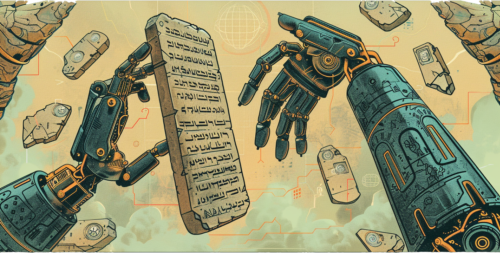Politics
Some thoughts on the Charlie Kirk Assassination
Until this month, I’m not sure I had heard of Charlie Kirk. Now the entire world has.
First of all, to any MAGA people reading this: No one on the progressive side wanted to see this man dead. That actions of the alleged murderer were his alone and don’t represent the views of practically anyone on the Left. So stop pretending otherwise. You’re not helping. The gunman’s motives are poorly understood and much more evidence must be collected in order to understand his political ideology. I’m not even sure he has a coherent philosophy. So attempts to reduce this to some vast left-wing political conspiracy is a ridiculous cognitive shortcut.
Louisiana and the Ten Commandments
Recently, the governor of Louisiana signed a bill requiring all public school classrooms in the state to display a poster-sized copy of the Ten Commandments. In the “Beforetimes” (before the current partisan Supreme Court took shape), this would have been struck down immediately as a violation of the Establishment Clause of the First Amendment. This bill is a clear violation of that clause. I imagine that the justices will dance around the cultural and historical significance of the document without stopping to consider the state’s motives in passing this law. While the proponents of the Ten Commandments aren’t wrong about its historical significance, the U.S. Constitution and its Amendments arguably hold more importance from the secular perspective that one must adopt in a public school.
The cancellation of Russian music
Where the power lies in 2021
From an article recently on the BBC Russian Service:
Блокировка уходящего президента США в “Твиттере” и “Фейсбуке” привела к необычной ситуации: теоретически Трамп еще может начать ядерную войну, но не может написать твит.
“Blocking the outgoing U.S. President from Twitter and Facebook has led to an unusual situation: theoretically Trump can still start a nuclear war, but cannot write a Tweet.”
In only a week, he won’t be able to do either. But while celebrating the deplatforming of this vicious clown, I have a tinge of worry about why it means for the future of democracy. It nearly goes without saying that social networks have become nearly the de facto equals of representative government in the U.S.
Consume media outside one's bubble?
That “reality bubbles” contribute heavily to increasing political polarization is well-known. Customized media diets at scale and social media feeds that are tailored to individual proclivities progressively narrow our understanding of perspectives other than our own. Yet, the cures are difficult and uncertain. Often, though, we’re advised to consume media from the other side of the political divide.
A sentence from a recent piece in The Atlantic encapsulates why I think this is such a fraught idea:
Solzhenitsyn on the folly of looking for good/evil dichotomies

Постепенно открылось мне, что линия, разделяющая добро и зло, проходит не между государствами, не между классами, не между партиями, — она проходит через каждое человеческое сердце — и черезо все человеческие сердца. Линия эта подвижна, она колеблется в нас с годами. Даже в сердце, объятом злом, она удерживает маленький плацдарм добра. Даже в наидобрейшем сердце — неискоренённый уголок зла.
My rough translation to English:
“Gradually it was revealed to me that the line separating good from evil passes not between States, nor between classes or parties. It passes through every human heart. The line shifts; it oscillates in us with the years. Even in a heart overwhelmed by evil, it retains a small bridgehead of good. Even the kindest hearts, there is an corner of evil not uprooted.”
A meritocracy reading list
Meritocracy has been on everyone’s minds lately, it seems. Reading Daniel Markovits’ “The Meritocracy Trap,” I was fully ready to condemn the concept completely. I may be still; but I need to take a moment to think about it more fully.
Here’s the problem with condemning meritocracy outright: if we look at ability on a case-by-case basis, would you rather a well-trained, accomplished pilot or a mediocre one? Would you rather go to a concert performed by a scratchy third-rate violinist or someone whose pedigree includes Juilliard, Curtis, or the like? Maybe the problem with meritocracy is simply that it doesn’t scale well in capitalist markets. (Don’t hold me to that idea; I’m not quite ready to embrace it fully.) In the process of scaling to the level of a large society, does any inherent rightness of merit confer a right to so distort the economic life of a country that only narrower and narrower slices of it garner larger and larger portions of the economic output?

